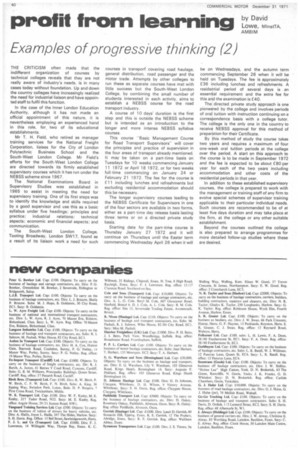profit from learning b LOZ avd nstTA
Page 42

If you've noticed an error in this article please click here to report it so we can fix it.
Examples of progressive thinking (2)
THE CRITICISM often made that the indifferent organization of courses by technical colleges reveals that they are not really aware of industry's needs, is in many cases today without foundation. Up and down the country colleges have increasingly realized the need for industrial liaison and have appointed staff to fulfil this function.
In the case of the Inner London Education Authority, although it has not made an official appointment of this nature, it is nevertheless employing an experienced hand in this role, for two of its educational establishments.
Mr T. H. Field, who retired as manager training services for the National Freight Corporation, liaises for the City of London Polytechnic Business School and the South-West London College. Mr Field's efforts for the South-West London College are directed towards its firmly established supervisory courses which it has run under the NEBSS scheme since 1967.
The National Examinations Board in Supervisory Studies was established in 1965 to assist in meeting the need for supervisory training. One of its first steps was to identify the knowledge and skills required by a good supervisor and use this as a basic syllabus under five headings; principles and practice: industrial relations; technical aspects; economic and financial aspects; and communication.
The South-West London College, Tooting Broadway, London SVV17, found as a result of its liaison work a need for such courses in transport covering road haulage, general distribution, road passenger and the Motor trade_ Attempts by other colleges to run these as separate courses have met with little success but the South-West London College. by combining the small number of students interested in each activity, aims to establish a NEBSS course for the road transport industry.
A course of 10 days' duration is the first step and this is outside the NEBSS scheme but is intended as an introduction to the longer and more intense NEBSS syllabus courses.
This course "Basic Management Course for Road Transport Supervisorswill cover the principles and practice of supervision in the four areas of transport already mentioned. It may be taken on a part-time basis on Tuesdays for 10 weeks commencing January 11 1972 or April 18 1972, or for two weeks full-time commencing on January 24 or February 21 1972 The fee for the course is £11 including lunches and refreshments but excluding residential accommodation should this be necessary.
The longer supervisory courses leading to the NEBSS Certificate for Supervisors in one of the four sectors are available in two forms, either as a part-time day release basis lasting three terms or on a directed private study basis.
Starting date for the part-time course is Thursday January 27 1972 and it will continue on Thursdays until the Easter term commencing Wednesday April 26 when it will be on Wednesdays, and the autumn term commencing September 26 when it will be held on Tuesdays. The fee is approximately £36 including lunches and refreshments. A residential period of several days is an essential requirement and the extra fee for this and the examination is £40.
The directed private study approach is one pioneered by the college and involves periods of oral tuition with instruction continuing on a correspondence basis with a college tutor. The college is the only one in the country to receive NEBSS approval for this method of preparation for their Certificate.
By this method of study the course takes two years and requires a maximum of four one-week oral tuition periods at the college over the !period. A start on this approach to the course is to be made in September 1972 and the fee is expected to be about £80 per year for each of the two years including accommodation and other costs of the residential periods in that year.
In addition to these established supervisory courses, the college is prepared to work with the management or training staff of any firm to evolve special schemes of supervisor training applicable to their particular individual needs. Such courses are recommended to be of at least five days duration and may take place at the firm, at the college or any other suitable establishment.
Beyond the courses outlined the college is also prepared to arrange programmes for more detailed follow-up studies where these are desired.












































































